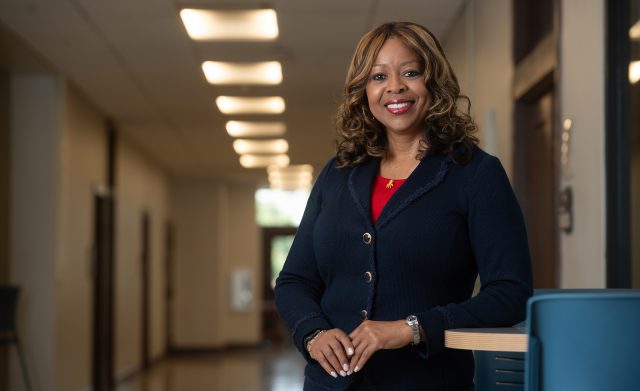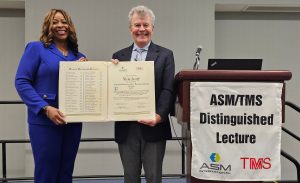
Engineering Dean Viola Acoff has been recognized by The Minerals, Metals and Materials Society and ASM International for her work to encourage students to consider degrees and careers in materials science and engineering. She received a Distinguished Lectureship in Materials and Society Award from the two international engineering organizations. Photo by Kevin Bain/Ole Miss Digital Imaging Services
OXFORD, Miss. – Viola L. Acoff, dean of the University of Mississippi School of Engineering, has been presented with a Distinguished Lectureship in Materials and Society Award from two international engineering organizations.
She was honored Oct. 17 at the 2023 International Materials, Applications and Technologies meeting in Detroit. The lectureship is awarded jointly by The Minerals, Metals and Materials Society and ASM International.
“I was truly honored,” Acoff said. “To have people from both major professional societies come together to nominate me – and then for me to win – I’m just thrilled.
“The former winners are a who’s who of people in my field – from education, industry, government agencies and those who have made major contributions to society in general. I consider it a privilege to be listed among them.”
This annual award recognizes an individual who is experienced in a policymaking role in the materials engineering field. Acoff was specifically acknowledged for leading the organizations’ “advocacy for racial justice for African Americans in U.S. legislative offices” and for “exceptional technical achievements and impact on broadening participation” in materials science and engineering.
“Dean Acoff presented a superb strategic vision for the materials workforce of the future,” said David Williams, immediate past president of ASM International and emeritus dean and professor at Ohio State University.

David Williams (right), president of ASM International, presents Viola Acoff with the Distinguished Lectureship in Materials and Society Award. Submitted photo
“Her technical knowledge and policy experience, when melded together, educated the audience on how universities can partner with industries and government agencies to solve the need for STEM-educated employees across the USA.”
Acoff gave the distinguished lecture, “Reimagining the Development of a 21st Century Workforce to Address Society’s Need for Materials Engineering and Technology,” on Oct. 16.
“The field of materials engineering has been around forever,” she said. “Even major eras of prehistoric civilization are named after the materials that people used to improve their lives: Stone Age, Bronze Age, Iron Age.
“Our field has been around so long and even today, it is necessary to further our technological advances into the 21st century and beyond.”
In light of this, engineers and educators must take into account changing U.S. demographics, Acoff said. Her talk focused on strategies to increase students from historically underrepresented groups in the areas of science, technology, engineering and math.
“Over the next 40 years, we are trending as a more racially and ethnically diverse society,” she said. “Those groups are historically underrepresented in STEM disciplines.
“In addition, economists state that producing adequate number of science and engineering Ph.D. degrees is vital to economic growth – not only in the U.S., but also globally. It’s vital that we produce engineering majors with both bachelor’s and graduate degrees.”
Acoff, who joined the Ole Miss engineering school as dean in July, spoke on her experience implementing summer bridge programs in partnership with historically Black colleges and universities during her tenure at the University of Alabama. The programs were aimed at HBCU undergraduate students and offered coursework and research opportunities to encourage them to pursue graduate education.
“Those are just a few things that I’ve done at past institutions that are successful,” she said. “We have piloted programs like this at the University of Mississippi and will continue to work toward finding ways to get more underrepresented students in our pipeline.”